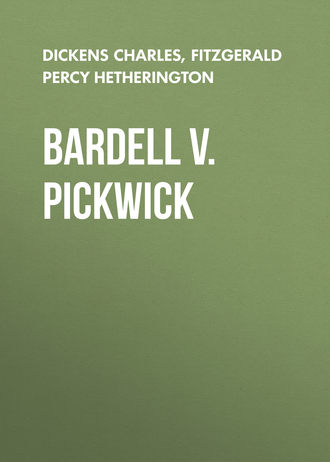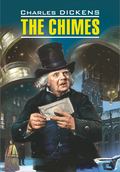
Чарльз Диккенс
Bardell v. Pickwick
RELEASE FROM THE FLEET
But the circumstances connected with Mr. Pickwick’s release from the Fleet, show the adroitness and ability of Dodson in a high degree. It will be recollected that when Job rushed with the news to Perker, that gentleman and his clerk broke out into raptuous admiration.
‘Now, Lowten,’ said little Mr. Perker, shutting the door, ‘what’s the matter? No important letter come in a parcel, is there?’
‘No, sir,’ replied Lowten. ‘This is a messenger from Mr. Pickwick, sir.’
‘From Pickwick, eh?’ said the little man, turning quickly to Job. ‘Well; what is it?’
‘Dodson and Fogg have taken Mrs. Bardell in execution for her costs, sir,’ said Job.
‘No!’ exclaimed Perker, putting his hands in his pockets, and reclining against the sideboard.
‘Yes,’ said Job. ‘It seems they got a cognovit out of her for the amount of ’em, directly after the trial.’
‘By Jove!’ said Perker, taking both hands out of his pockets and striking the knuckles of his right against the palm of his left, emphatically, ‘those are the cleverest scamps I ever had anything to do with!’
‘The sharpest practitioners I ever knew, sir,’ observed Lowten.
‘Sharp!’ echoed Perker. ‘There’s no knowing where to have them.’
‘Very true, sir, there is not,’ replied Lowten; and then both master and man pondered for a few seconds, with animated countenances, as if they were reflecting upon one of the most beautiful and ingenious discoveries that the intellect of man had ever made. When they had in some measure recovered from their trance of admiration, Job Trotter discharged himself of the rest of his commission. Perker nodded his head thoughtfully, and pulled out his watch.
Now to the superficial this seemed to be evaded by the art of the firm in “getting the cognovit out of her.” But this was an ordinary, vulgar stroke – which anyone could have done. Their policy went far deeper, and this Perker was acute enough to recognize. There was no object in putting Mrs. Bardell into the Fleet.
They could no more get their costs out of her, than they could get them out of Mr. Pickwick. She had nothing but her few “sticks” of furniture, worth say £50. But the astute fellows saw what pressure could be put on the benevolent nature of Mr. Pickwick, who could not endure that a respectable woman should be exposed to the contamination of a debtor’s prison. And their sagacity was to be justified, and on the very next day, too.
It is curious, however, that no mention is made of Mrs. Bardell’s release. It, of course, took place before Mr. Pickwick’s. Here again Dodson and Fogg behaved very fairly, for they allowed both her and Mr. Pickwick to be released, without receiving payment, but simply on “an understanding” by Perker. As it turned out, indeed, they were not paid for some weeks.
The processes by which Mr. Pickwick was got into the Fleet were complicated enough, Habeas Corpus, appearing before functionaries, etc. But it is odd that in cases of persons of lower degree these seemed not to be necessary. We do not hear of them in Sam’s instance. While Mrs. Bardell, was taken straight from “the Spaniards,” to the prison door, she was not even formally arrested by the Bailiff, though he was in attendance. He sat afar off at Hampstead, taking his drink – and on the box during the drive. She might be said to have been arbitrarily taken to the prison by Jackson – without a legal warrant. Had not the business been compromised, some other astute firm of attorneys might have found subject for an action against Dodson and Fogg.
Another of the humorous incidents connected with the case is old Weller’s firm persuasion that Mr. Pickwick was to “stand his trial,” as though he were indicted for some criminal offence. We find him always astray as to when he was to be “tried,” etc. This is a most natural impression among the lower classes, who are not very clear as to the distinction between civil and criminal process, being most familiar with the latter. In the same spirit is his humorous suggestion of securing an alibi, as the best method of getting Mr. Pickwick off. “O Sammy, Sammy, vy worn’t there a alleybi!”
* * * * *
Such is “The Trial in Pickwick.”
Is there any writer, now living, I may be asked, who could furnish such a picture as this, one so full of reality and true humour, of one of our modern Courts of Justice? The answer must be that it would be idle to look for such a person. There are thousands who could supply minute drawings in which not a single detail would be omitted. But the piercing to the essence, the happy generalization, the knowledge of the true points of character, these would be sought in vain.





